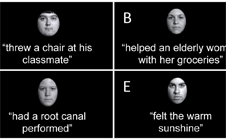Gossip triggers defensive response

Unflattering gossip about our friends, family members — even down-and-out movie stars — shapes our visual perception of these individuals and provides a looking glass into how we subconsciously protect ourselves from harm, according to a new study led by a neuroscientist at Northeastern University.
“You are more conscious of a face if you know something bad about that person,” says Distinguished Professor of Psychology Lisa Feldman-Barrett, who led the study. “Gossip,” she says, “has an effect on how the visual system works.”
The results of the study were reported in the journal Science.
Barrett collaborated with researchers from the University of California, Davis, Massachusetts General Hospital and Harvard Medical School to study the ways in which gossip informs human social interaction — especially in the absence of direct contact with an individual.
As part of the study, Barrett employed a technique in visual neuroscience called binocular rivalry, in which one image — say, a house — is presented to a subject’s left eye and a very different image — a smiling or scowling face — is presented to the right eye.
In this case, participants in the study were presented with images of visually neutral faces that were paired with three kinds of gossip: negative (“hit a dog” or “stole money”), positive (“helped an elderly woman cross the street” or “volunteered at an animal shelter”) or neutral (“mailed a letter” or “went shopping”). The faces were then paired with an unrelated image.
Faces associated with the negative gossip, researchers found, were more visually salient and viewed for longer periods of time than faces paired with the positive or neutral gossip.
As Barrett puts it, “If gossip helps predict who is friend and who is foe without first-hand experience of that person, then this strategy may have evolved to protect us from liars and cheaters.”
“If we see them for longer periods of time, then we can gather more information about their behavior.”
According to Barrett, we don’t interpret the world through the exclusivity of our senses. “Usually we assume that what you see influences what you feel, but here we have a case where what you feel about someone influences what you see visually. This has immediate use for translational science.”
View selected publications of Lisa Feldman Barrett in IRis, Northeastern’s digital archive.





